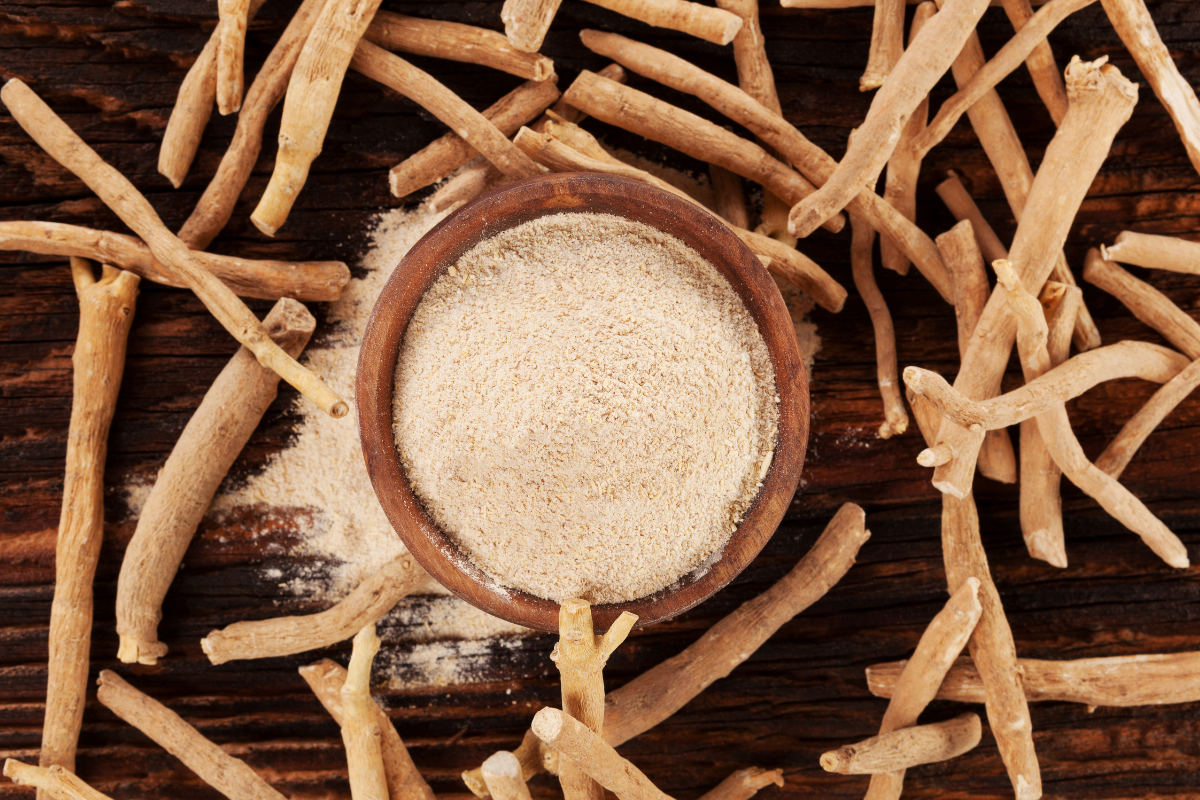Ashwagandha KSM-66® & collagen - health

Ashwagandha KSM-66® & collagen - health
Ashwagandha is one of the most important herbs in Ayurveda, which is a traditional form of alternative medicine based on Indian principles of natural healing.
People have used ashwagandha for thousands of years to relieve stress, increase energy levels, and improve concentration.
Its botanical name is Withania somnifera, and it is also known by several other names, including "Indian ginseng" and "winter cherry."
The Ashwagandha plant is a small shrub with yellow flowers that grows in India and Southeast Asia. Extracts or powders from the plant's root or leaves are used to treat a variety of conditions, including anxiety, sleep problems , and fertility problems .
HERE WE LIST NINE POTENTIAL BENEFITS OF ASHWAGANDHA, BASED ON RESEARCH
MAY HELP IMPROVE SLEEP
Many people take ashwagandha to promote a good night's sleep, and some evidence suggests it may help with sleep problems.
A study of 50 adults ages 65-80 found that those who took ashwagandha supplements for 12 weeks significantly improved their sleep quality and mental alertness compared to those who received a placebo.
An analysis of five high-quality studies found that ashwagandha had a small but significant positive effect on overall sleep quality.
Taking ashwagandha reduced people's anxiety levels and helped them feel more alert when they woke up. The researchers noted that the results were more pronounced in people who suffered from insomnia.
Ashwagandha can be an effective dietary supplement for improving sleep and can especially help people who suffer from insomnia.
CAN HELP REDUCE STRESS AND ANXIETY
Ashwagandha is perhaps best known for its ability to reduce stress. It is classified as an adaptogen, a substance that helps the body deal with stress.
Ashwagandha helps control mediators of stress. It also reduces the activity of the stress axis, or hypothalamic-pituitary-adrenal axis (HPA axis), a system in the body that regulates the stress response.
Several studies have shown that ashwagandha supplements can help relieve stress and anxiety symptoms.
Ashwagandha can be effective in reducing stress and anxiety symptoms.
MAY BENEFIT PHYSICAL PERFORMANCE
Research has shown that ashwagandha can have positive effects on physical performance and can be a valuable dietary supplement for athletes.
An analysis of 12 different research studies on men and women who took ashwagandha at doses between 120 mg and 1250 mg per day showed that the herb can improve physical performance, including strength and oxygen utilization during exercise.
An analysis of five studies showed that taking ashwagandha significantly improved maximal oxygen consumption (VO2 max) in healthy adults and athletes.
VO2 max is the maximum amount of oxygen a person can use during intense activity. It is a measure of heart and lung fitness.
Having an optimal VO2 max is important for athletes and non-athletes alike. Low VO2 max is associated with increased mortality risk, while higher VO2 max is associated with a lower risk of heart disease.
In addition, ashwagandha can help increase muscle strength.
In one study, male participants who took ashwagandha daily and did weight training for 8 weeks had significantly better results in muscle strength and size compared to a placebo group.
Ashwagandha can help improve physical performance in athletes and healthy adults, including increasing VO2 max and strength.
MAY REDUCE SYMPTOMS OF CERTAIN MENTAL HEALTH CONDITIONS
Some evidence suggests that ashwagandha may help reduce the symptoms of mental health conditions, including depression.
In one study, researchers looked at the effects of ashwagandha in 66 people with schizophrenia who were experiencing depression and anxiety.
They found that participants who took 1,000 mg of ashwagandha extract daily for 12 weeks became less depressed and had less anxiety than those who took a placebo.
Additionally, results from another study suggest that ashwagandha may help reduce perceived stress in people with schizophrenia.
Although some findings suggest that ashwagandha may have some antidepressant effects in some people, it should not be used as a substitute for antidepressants.
Research suggests that ashwagandha can help reduce the symptoms of depression and benefit people with certain mental health conditions.
MAY HELP INCREASE TESTOSTERONE AND INCREASE FERTILITY IN MEN
Dietary supplements with ashwagandha have been shown in some studies to benefit male fertility and increase testosterone levels.
In a study of 43 obese men aged 40-70 years who suffered from mild fatigue, and who consumed dietary supplements containing ashwagandha extract or a placebo daily for 8 weeks, showed that ashwaganda increased levels of the hormone DHEA-S by 18%. DHEA is a sex hormone involved in testosterone production. Participants who took the herb also had a 14.7% greater increase in testosterone than those who took the placebo.
In addition, by analyzing four studies, it was found that taking ashwagandha significantly increased sperm concentration, sperm volume, and sperm motility in men with low sperm counts.
Ashwagandha also increased sperm concentration and sperm motility in men with normal sperm counts.
However, the researchers concluded that there is currently insufficient data to confirm the potential benefits of ashwagandha for male fertility and that more high-quality studies are needed.
Ashwagandha can help increase testosterone levels and may have some potential benefits for male fertility.
MAY LOWER BLOOD SUGAR LEVELS
Limited evidence suggests that ashwagandha may have some benefits for people with diabetes or people with high blood sugar levels.
An analysis of 24 studies, including 5 clinical trials in people with diabetes, found that a dietary supplement with ashwagandha significantly reduced blood sugar, hemoglobin A1c (HbA1c)*, insulin, blood lipids, and oxidative stress markers.
*HbA1c is a form of hemoglobin. It is a protein in the blood and gives the blood its red color. Hemoglobin is found in the red blood cells and transports oxygen from the lungs out to the body's organs. HbA1c is formed when hemoglobin reacts with blood sugar, i.e. glucose. HbA1c is a blood test that shows the level of blood sugar in the last two to three months before the sample is taken. The test is therefore sometimes called long-term sugar.
It is believed that certain compounds in ashwagandha, including one called withaferin A (WA), have powerful antidiabetic activity and may help stimulate cells to take up glucose from the blood.
Ashwagandha can lower blood sugar levels through its effects on insulin secretion and the cells' ability to absorb glucose from the bloodstream.
CAN REDUCE INFLAMMATION
Ashwagandha contains compounds, including withaferin A (WA), that can help reduce inflammation in the body.
Researchers have found that WA targets inflammatory pathways in the body, including certain signaling molecules.
Animal studies have shown that WA can also help reduce levels of inflammatory proteins such as interleukin-10 (IL-10).
There is some evidence that ashwagandha may help reduce inflammatory markers in humans as well.
In a study of adults who felt stressed and who consumed ashwagandha extract for 60 days, had significant reductions in C-reactive protein - an inflammatory marker - compared to those who consumed a placebo.
Ashwagandha can help reduce inflammatory markers in the body. However, more research is needed.
CAN IMPROVE BRAIN FUNCTION, INCLUDING MEMORY
Ashwagandha may benefit cognitive function. After an analysis of five clinical studies, it was noted that there was evidence that ashwagandha could improve cognitive function in certain populations, including older adults with mild cognitive impairment and people with schizophrenia.
Cognitive functions benefited were as follows:
- attention
- reaction time
- the performance of cognitive tasks
A study of 50 adults showed that taking 600 mg of ashwagandha extract per day for 8 weeks led to significant improvements as shown below, compared to taking a placebo:
- immediate and general memory
- attention
- how fast the individual processes information
Researchers have shown that compounds found in ashwagandha, including WA, have antioxidant effects in the brain, which may benefit cognitive health.
Supplementation with ashwagandha may improve memory, reaction time, and the ability to perform tasks in certain populations.
RELATIVELY SAFE AND GENERALLY AVAILABLE
Ashwagandha is a safe dietary supplement for most people, although its long-term effects are unknown. An analysis of 69 studies found that ashwagandha root appears to be safe and effective in managing certain health conditions, including stress, anxiety, and insomnia.
A study of 80 healthy men and women showed that a daily ashwagandha supplement was safe and caused no adverse health effects in the participants.
However, some people should not ingest the herb. For example, pregnant women should avoid ashwagandha supplements because the herb can cause miscarriage if used in high doses.
Also, those with hormone-sensitive prostate cancer and those taking certain medications, such as benzodiazepines, epilepsy drugs, or barbiturates, should avoid taking ashwagandha.
Some side effects have been reported in people taking ashwagandha supplements, such as drowsiness and diarrhea.
In addition, ashwagandha can affect the thyroid gland, so those suffering from thyroid problems should talk to their doctor before possibly taking a dietary supplement with the herb.
Research results suggest that ashwagandha's effects are not immediate, so keep in mind that you may need to take an ashwagandha supplement for several months before you begin to notice its effects.
Ashwagandha is an ancient medicinal herb with several potential health benefits.
Results from several studies suggest that ashwagandha can help reduce anxiety and stress, promote a good night's sleep, and even improve cognitive function in some populations.
Ashwagandha is considered relatively safe for most people.
ASHWAGANDHA IS FOUND IN THE FOLLOWING DIETARY SUPPLEMENTS WITH COLLAGEN:
COLLAGEN - SLEEP & RELAX WITH KSM-66 ASHWAGANDHA ® - Collagen supplement for sleep & relaxation
What are the health and wellness benefits of ashwagandha?
Ashwagandha lowers blood sugar and blood lipids.
A couple of small clinical studies found that ashwagandha may be helpful in reducing blood sugar levels and triglycerides (the most common type of fat in the blood). One study compared ashwagandha's blood sugar-lowering effects to the drugs prescribed for type 2 diabetes .
Ashwagandha increases muscle mass and strength.
Studies show ashwagandha's effectiveness in improving strength and muscle volume. One study found that participants became stronger. Another study observed an increase in muscle strength, along with a lower percent body fat and decreased cholesterol levels when ashwagandha was taken as a dietary supplement. Some participants also experienced better sleep, however, this study did not compare ashwagandha intake with placebo.
Dietary supplementation with ashwagandha produced positive results in another study conducted only with male participants. Compared to the placebo group, men who received ashwagandha were seen to have significant gains in muscle strength (measured in bench press and leg strength exercises) and arm and chest muscle strength, as well as a significant reduction in body fat percentage.
Ashwagandha improves sexual function in women.
A clinical study indicates that ashwagandha may benefit women experiencing sexual dysfunction. Ingestion of ashwagandha resulted in significant improvements in arousal, orgasm and satisfaction, as self-reported by participants. Ashwagandha also significantly improved the number of successful sexual encounters and improved measures of anxiety about their sex life and sexuality.
Ashwagandha increases fertility and testosterone levels in men.
Ashwagandha may also provide male reproductive benefits. Ingestion of ashwagandha in men has been shown to significantly improve sperm quality by balancing reproductive hormone levels . After one study, 14% of the male patients' partners became pregnant .
In another stress-related ashwagandha study, researchers found that the herb increased testosterone levels in male participants but not in female participants. Another study testing ashwagandha's effect on muscle strength in men also measured a significant increase in testosterone.
Ashwagandha sharpens focus and memory.
Ashwagandha can help improve cognition and memory. Small studies have found that ashwagandha, compared to placebo, significantly improved participants' reaction times during cognitive and psychomotor tests (which measure the ability to respond to instructions and execute) .
Ashwagandha supports heart health.
At least two studies have shown that ashwagandha can increase maximal oxygen uptake capacity, or VO2-max* as it is abbreviated - which is the maximum amount of oxygen you take in while performing physical activity. These levels are used to measure cardiorespiratory endurance - how well the heart and lungs deliver oxygen to the muscles during physical activity. Thus, higher VO2 levels may indicate a healthy heart that is working well.
*The letters in VO2MAX come from V for volume, O2 for oxygen and MAX for maximum. It is a measure of how much oxygen your body can maximally absorb and use to propel you forward. It is measured in a unit of mg/kg/min, which means how much oxygen in milliliters per kilogram of body and per minute that your muscles can take care of.
- Tags: Kollagen/Collagen Sömn/Sleep






